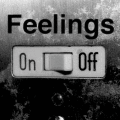
I hear it all too often when speaking to survivors of a suicide loss. “I was doing so well” they will say, “and then I had a day where I couldn’t help but cry.”  I am not sure why we think tears are a sign of weakness. Tears are similar to laughter; they are a way to express an emotion. A way to communicate that we have been deeply touched by a sound, smell, image or memory. They remind us that we are human. Crying does not mean that we haven’t begun to move forward. In my opinion, tears are a sign that we are beginning to heal. There is no way to get over the pain of a suicide loss; we can only get through it. It has been four years since I lost my dad to suicide. I still have moments where I find myself in tears. It doesn’t mean that I haven’t moved forward in my life. It just means that I miss my dad, and wish he were here. I don’t ever want to stop crying. Those tears are a reminder of the love I will always have for him, and the memories we made together while he was living.
I am not sure why we think tears are a sign of weakness. Tears are similar to laughter; they are a way to express an emotion. A way to communicate that we have been deeply touched by a sound, smell, image or memory. They remind us that we are human. Crying does not mean that we haven’t begun to move forward. In my opinion, tears are a sign that we are beginning to heal. There is no way to get over the pain of a suicide loss; we can only get through it. It has been four years since I lost my dad to suicide. I still have moments where I find myself in tears. It doesn’t mean that I haven’t moved forward in my life. It just means that I miss my dad, and wish he were here. I don’t ever want to stop crying. Those tears are a reminder of the love I will always have for him, and the memories we made together while he was living.




Absolutely! My son took his life at 18. He is forever 18. I ran into a friend of his in Walmart on Friday night. I hadn’t seen Justin in some time, and he didn’t look like a boy anymore. He was a man. My Craig is still 18. I couldn’t help but cry as I spoke with him. Thankfully he was kind and understood. My son has been gone 9 1/2 years. There are oh so many days I do not cry, but sometimes I find it soothing to my soul.
Thank you for validating this.
WOW! Does this recent post ring loud and clear for me, Jessica. I came across your blog by happenstance about 2 months ago and I have found it rather comforting to read the posts. My dear husband of 43 years passed away by his own hand in February and it seems as with every step forward that I take I fall behind by three. I have dreaded the arrival of every holiday this year, but especially this Christmas. I have tried to avoid all of the usual Christmas trappings so as to try and avoid further pain. Well, last night I happened to be overcome with such sadness when a particular Christmas movie was playing on TV. I found myself crying for the rest of the evening.
Since my husband’s suicide is still very recent to me I am curious if others find themselves with continued ruminations of what they may have been able to do to divert the tragedy. I often find myself trying to recall specific incidents and what I should have/could have/would have done differently had I only known how depressed my husband was. And I continue to blame myself that after being so much a part of his life for so many years that I wasn’t able to detect his terrible sadness. Often people try and comfort me by saying, “Oh, don’t blame yourself. Those who are thinking of taking their life go to great lengths to hide the signs especially from the ones they love.”. Or, I have often heard “THEY have made up their mind and there was nothing that you could have done to dissuade them or change their mind.” But I often wonder if that is truly the case for ALL suicide victims.
I am grateful for finding this blog since I opted not to seek any therapy regarding my husband’s tragic passing. My thoughts on the subject were that the therapist had never met my husband or myself so how could they truly help me on a personal level. They would be repeating the same rhetoric that they have given to other suicide survivors–they wouldn’t be talking to just me. Instead I found/find myself reading books and website articles on the sad subject hoping that it will help me as I try to move forward while still keeping my dear husband’s memory with me.
We are happy that you found our blog as well. What you are experiencing is completely normal. I have yet to meet a survivor who has not experienced what you are talking about. We often feel like we had more control over the situation (and the person) than we really did, or we are able to have. The self blame and guilt are often the most difficult to work through. It takes time to not only forgive the person we lost, but ourselves for not being able to save them. I have found in my own work that their minds are often made up. I have also found that this is often not the first and only time they contemplated suicide. While there can be a number of factors that contributed to their decision, often it is simply a loss a hope. Hope is difficult to instill in others; often we have to find it in ourselves. I wish I had all the answers, but honestly they aren’t any. We just have to find the conclusion that gives us comfort and allows us to begin moving forward.
We hope to continue to offer you support on your journey. And remember, it isn’t about getting over the pain, it is about getting through it.
I really had no idea that it was possible to cry as much as I have after I lost my beloved partner to suicide. For weeks it was every day several times a day. Finally a point came when I got days with no crying. Now seven months on it still comes unexpectedly. I don’t feel better afterwards or like I have released some grief and can feel better for it. Maybe that will come in time. I miss him so much and have a lot of what ifs. It is hard to not feel I could have stopped what he did. Thank you for this site, there is so much on it that is helpful x
We are happy that our site offers you comfort. I found myself crying in the middle of a movie the other day as the man talked about the loss of his brother to suicide. He didn’t go into great detail, just mentioned enough. Did I feel better after? Not necessarily, but I was happy I allowed myself to just feel the pain of the loss. I think that is more of what it is about. Feeling, instead of stuffing. Still, four years later, I find myself crying. Not as often as I used to, but the pain will never be gone. It is just no longer in the front of everything else.